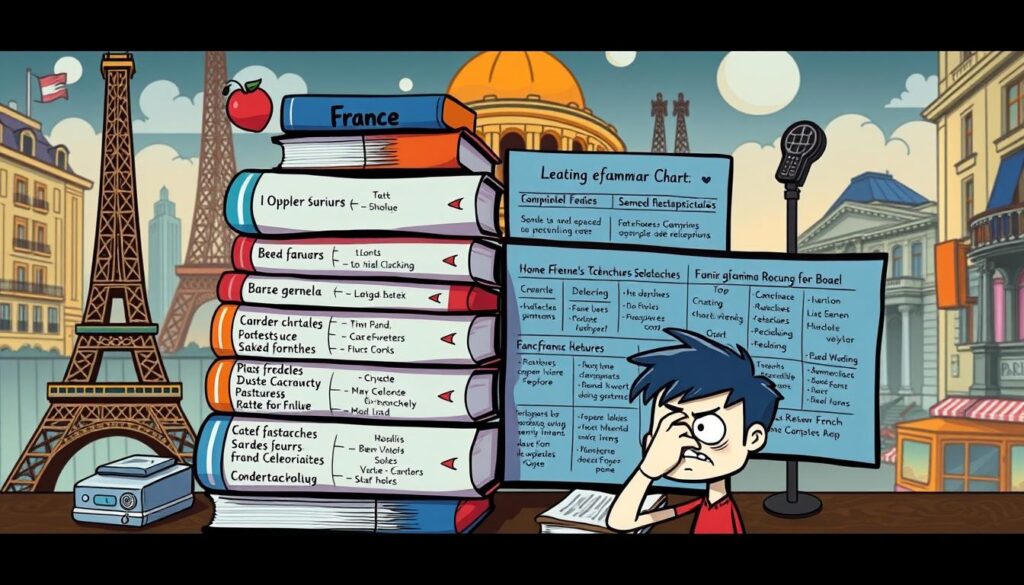As an ambitious learner, you’re on a journey to understand French basics. This adventure is exciting and rewarding. Whether you dream of reading French books in their original language or chatting in Paris, learning French grammar and key phrases is crucial. It not only connects you to French culture but also makes learning languages like Spanish and Italian easier.
Your journey begins with learning essential greetings at a French Summer Camp. Here, you’ll start with “Bonjour” and “Merci,” diving into the heart of French cordiality. As you practice, you’ll feel more connected to French culture. Every “Bonsoir” you say opens up more understanding and opportunities for language growth.
Practicing is key to mastering French, especially polite phrases. Asking “On peut parler en français?” shows you’re eager to learn and invites real conversations. This pursuit enriches your travels and could even help you learn other languages more easily. By embracing these principles, you lay a solid foundation for your multilingual journey.
Don’t forget the power of simple phrases like “Salut” and “C’est pas faux.” These words can bring joy in casual settings. Consistently using these greetings is crucial. They serve as your introduction to the Francophone world. Your gateway to exploring more languages and cultures.
Embracing French Language Fundamentals
Diving into French means learning how it’s spoken and written. It’s key if you want to get better. Knowing the quirks that set spoken and written French apart will help a lot. You’ll get better at grammar and speaking clearly.
Understanding the Difference Between Written and Spoken French
Written French is formal and rich in vocabulary. On the other hand, spoken French is livelier and uses shortcuts. This is crucial for learning. For instance, spoken French often drops the ‘ne’ in negatives. Realizing this will sharpen your understanding.
Avoiding Over-Reliance on Direct Translations
Trying to translate directly from English to French is a common mistake. It can slow you down and cause errors. Using visuals or context to learn French words is much better.
Now, let’s look at some helpful tips for mastering French:
| Learning Principle | Application in Mastering French | Benefit |
|---|---|---|
| Consistent Practice | Regularly engage in both listening and speaking exercises. | Enhances retention and fluency over time. |
| Embracing Imperfection | Communicate without fear of making mistakes. | Boosts confidence and practical learning through real-life interactions. |
| Setting Achievable Goals | Start with daily, achievable linguistic objectives before scaling up. | Keeps motivation high and provides clear markers of progress. |
| Valuing Effective Communication | Focus on conveying your message clearly instead of perfect accuracy. | Aids in better interpersonal relationships and real-world language application. |
By using these strategies every day, you’ll not only get better at French. You’ll also have a more enjoyable time learning. You’ll appreciate the cultural details and everyday use in France. And you’ll love getting to know the beauty of French grammar and the joy of this beautiful language.
Strategies to Improve French Language Fluency
Learning French involves mixing old and new learning ways. It helps speed up your learning. If you want to improve your French skills and become fluent, you need a good plan. Adding these methods to your daily life can boost your understanding and speaking skills a lot.
Start with learning essential French phrases. They are key for day-to-day talks. This includes greetings, ordering food, or asking for directions. These phrases are crucial for everyday chats in French. Keep practicing them. This moves the phrases to your long-term memory, making speaking them easy and automatic.
Using multimedia to learn French basics works very well. Follow French speakers online or listen to podcasts. Louis French Lessons or Le Journal en français facile from Radio France International are great. They turn global news into easy-to-learn pieces. Watching French news on France24 helps too. It improves listening skills and helps you get used to different accents.
Try these French learning tools:
- Apps like Duolingo for learning French grammar with fun exercises.
- Websites like Preply.com, which make learning a game to test your skills.
- Meetup.com for online French meetups, letting you practice talking.
Here are more fun ways to improve your French skills:
| Strategy | Description | Frequency |
|---|---|---|
| Flashcards | Use flashcards to memorize vocabulary. | Daily |
| Reading Aloud | Read French books out loud to get better at pronunciation and memory. | Twice a week |
| Language Partners | Talk with a variety of French speakers to understand different ways of speaking. | Weekly |
| Virtual Classes | Sign up for online French classes that suit your busy life. | Regular sessions |
Lastly, immersion beats everything. If you can, spend time in a French-speaking place. Being surrounded by the French language and culture is priceless. It makes learning much faster. Stick with these methods, stay excited, and you’ll greatly improve your French speaking ability.
Should Know Better French: Approaches to Effective Learning
Mastering French can be an exciting journey with the right learning resources. Check out French language learning resources whether you’re starting out or polishing your skills. Understanding how you learn best is key. Choose resources that offer full explanations and mix traditional and modern French.
It’s important to set up a structured learning plan. Combine audio tools for auditory learners with visual aids for visual learners. Kinesthetic learners should practice speaking and writing French. Seek professional help if self-study gets tough. This will help you keep getting better at French.
Remember, being proficient means correctly and confidently using French in context. Learn by doing more than memorizing words. Immerse yourself in the language through daily use and classes, especially with native speakers. This boosts your practical knowledge and pronunciation, which is vital.
| Learning Approach | Advantages | Disadvantages |
|---|---|---|
| Immersive | A rapid way to acquire fluency, daily practice, cultural insights | Can be costly, intense for beginners, potential cultural barriers |
| Grammar-based | Easier integration of new French vocabulary, clear rules structure | Limited conversational practice, may lead to boredom |
| Communicative | Quick conversational skills, interaction-focused, well-rounded | Varying class quality, can be expensive, uneven progress |
| Vocabulary-focused | Fast vocabulary expansion, time-saving, cost-effective for beginners | Limited practical conversation skills, grammar might lag |
For a deeper dive into French, explore beginner French vocabulary in context. Adapting learning methods to your preferences and using different teaching models can make learning French a journey of continuous growth and discovery.
The Role of Consistency in Learning French Basics
When starting to learn French basics, making it a daily habit is essential. Regular practice, by using French language tips, helps smooth your learning path. It also makes beginner French vocabulary stick better in your memory.
Setting a Regular Study Schedule
Consistency is crucial when picking up a new skill, like French basics. Setting a fixed study time every day is important. It could be a short 10-minute vocabulary review or an intense one-hour weekly lesson. Adding daily listening practice helps too. This routine makes skipping sessions less likely.
The Benefits of Short, Frequent Study Sessions
Learning French in short, daily sessions feels easier and improves memory. Studying new words each day solidifies your learning and improves memory. Short, regular sessions are better than long, tiring ones. They keep the language exciting.
Below is a table showing the advantages of a consistent study schedule for French. This includes various strategies and benefits:
| Strategy | Description | Benefits |
|---|---|---|
| Daily Vocabulary Review | Review new words and phrases for 10 minutes daily. | Improves memory retention and builds a strong foundational vocabulary. |
| Weekly Intensive Session | Dedicate one hour each week to intensive study focusing on grammar and conversation. | Allows deeper exploration of complex topics and practical application. |
| Daily Listening Practice | Include French listening exercises in your daily routine. | Enhances understanding of spoken French and improves pronunciation. |
| Monthly Progress Tracking | Review and adjust your study plan based on monthly evaluations. | Keeps you motivated and aligned with your language learning goals. |
Missing a session occasionally won’t ruin your progress, but regular practice will make you fluent. Keep your goals clear, work on the language every day, and soon, you’ll speak French naturally. Embrace this journey, celebrate your wins, and keep pushing yourself with new lessons to truly master French basics.
Expanding Your French Vocabulary with Immersive Techniques
Diving into the French language is a crucial step to mastering essential French phrases. French is official in 29 countries, highlighting its importance for global communication. By engaging with various resources like news and social media, you learn more than just textbook French.
Listening to French podcasts and watching French TV shows are great for understanding the language’s flow. This helps grasp spoken French and learn everyday words. Spending time in a French-speaking country, through study or exchange programs, also improves your language skills greatly. Apps like Anki, Memrise, Duolingo, Babbel, and Rosetta Stone enhance your vocabulary and help use it confidently.
Using new words daily makes learning more effective. Talking to yourself in French and incorporating new words into your day helps remember and use them. Learning about 50 new words daily can boost your communication greatly. Keeping a journal tracks progress while natural conversations improve speaking. These steps make you a fluent French speaker, capable of easy conversation in the language of Molière.


